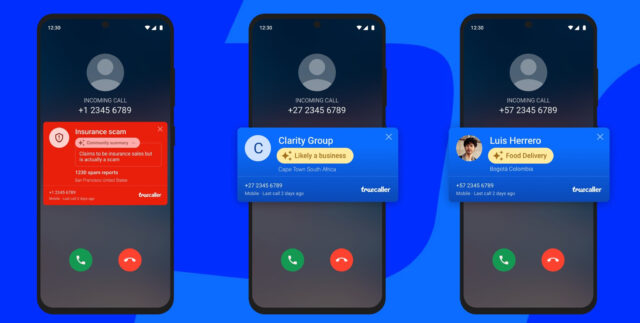Truecaller adds AI to caller ID to show you not just who's calling but why -- and while the phone is still ringing

Truecaller has announced an AI-powered expansion of its caller ID service, aiming to reveal not only who is on the other end of the line, but also why they are phoning you.
The company says the new feature brings real-time context to incoming calls, with the goal of reducing uncertainty for its 450 million global users. The update comes as scam calls and fraud attempts continue to skyrocket worldwide.
SEE ALSO: WhatsApp launches new tools to stop scammers
The Swedish company says that its updated Caller ID goes beyond displaying a name or a spam tag. It now generates AI-driven insights such as whether a call is likely from a business, whether the number is associated with fraud, or whether it falls into categories like delivery or customer support.
It can even summarize hundreds of user comments into a single line while the phone is still ringing.
“People hesitate to answer unknown calls because they lack context and in today's world, context is everything,” said Rishit Jhunjhunwala, Global CEO of Truecaller. “Truecaller was built to solve this: not just to identify who's calling, but to help you understand why. Is it someone from your network, a delivery, a business or a scam? Our AI uses real-time data and contextual signals to give you clarity the moment your phone rings, turning uncertainty into informed choice. Knowing 'who' is calling is only part of the story.”
The company says its system is capable of intercepting billions of signals from calls, texts, and user feedback every day.
Adaptive caller ID
Telecom services typically make use of static databases, but Truecaller’s AI model is adaptive, learning from behavior patterns and updating classifications in real time.
The firm also stressed that the majority of contextual insights are created dynamically by AI, without requiring businesses to register or label themselves.
The expansion comes at a time when fraudulent calls remain a growing problem. Truecaller said it identified over 56 billion spam and fraud calls in 2024.
According to the Global Anti Scam Alliance and Feedzai, worldwide scam losses reached an estimated $1.03 trillion last year.
Although Truecaller describes its use of AI as a safety tool, some questions will inevitably be asked about accuracy, privacy, and reliance on community-driven reports.
Automatically assigning intent to unknown calls could help users filter out risks, but it also raises the possibility of misclassification or overreliance on algorithmic judgment. Until it’s in widespread use we won’t know how accurate it is, and perhaps not even then.
Truecaller says its advantage lies in scale. With users in more than 190 countries, the system gathers a constant flow of feedback that fuels its AI models. This community-powered loop, it argues, allows the platform to detect scams across borders and adapt to shifting fraud patterns faster than traditional methods.
What do you think about AI-powered caller ID? Let us know in the comments.
